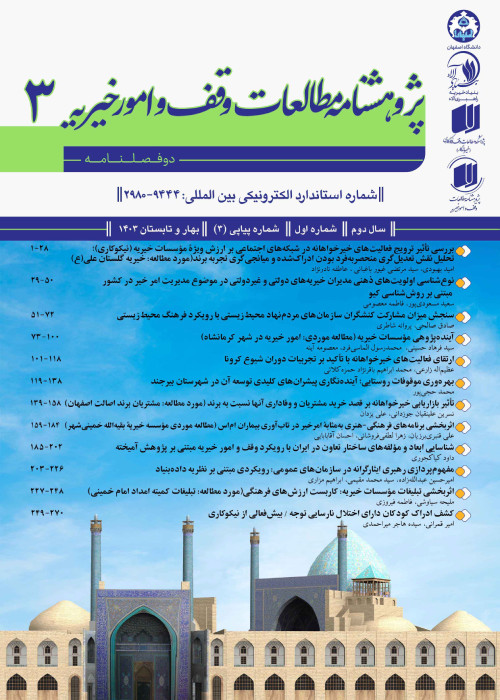The Challenges and Issues of Charity Work in Marginalized Regions
IntroductionToday, charities play an important part in diminishing poverty for the underprivileged in marginalized regions and are taken notice of by the authorities and different strata of people. Nevertheless, it seems that the charitable process has suffered tangible and intangible harms, bringing it face-to-face with challenges in these regions when endeavoring to perform services. Neglecting such harms and challenges may lead to deviations in performance and results in charity work as a whole in society. Hence, it is vital to study the various aspects of such activities, identify challenges in these regions, and evaluate charitable services in marginalized regions. In this research, efforts have been made to study the lived experiences of people involved in charity work in marginalized regions using a qualitative and sociological analytical approach. The research aims to identify challenges related to charity work in marginalized regions using the qualitative research method and conducting in-depth qualitative interviews with benefactors and individuals who have experienced charitable work in these regions. This research seeks to answer the questions of what experiences benefactors have in charity work in marginalized regions and their descriptions of it. Also, it asks the question of what they consider to be the most important challenges in charity work in these regions.MethodologyThe present research has been conducted using the qualitative method and a phenomenological approach. The researchers have conducted in-depth semi-structured interviews in an effort to identify and study the challenges faced in charity work in marginalized regions by understanding the descriptions and interpretations of the participants. Eventually, 17 men and women who had the experience of charity work for the period of at least one year in a charitable institution and registered NGOs were interviewed. The interviewees included 6 men and 11 women in the 22-36 age bracket. All the participants were selected using purposeful snowball sampling until data saturation. Furthermore, efforts were made to select interviewees from among active benefactors in different parts of the country, such as the marginalized areas of the cities of Tehran, Urmia, Bandar Abbas, Rasht, Isfahan, Mashhad, etc, aiming to observe maximum diversity and interview knowledgeable participants. Each interview lasted for the duration of 25-50 minutes. Prior to the interview, complete explanations were provided about the research and its objectives to comply with research ethics. The consent of the participants was obtained and interviews were recorded. Data analysis was performed immediately following each interview. The recorded files were initially transcribed and then analyzed. The 7-step Colaizzi method of data analysis was used. FindingsOverall, the findings of the research, which are the outcome of the analysis of interviews conducted with the benefactors, were classified in two main categories. The main category is the “internal and regional characteristics”, including the three subcategories of “the space and fabric of marginalized areas”, “vicious circle of poverty and marginalization”, and “internalized feelings of deprivation and neediness”. The second category is the “structure of charitable organizations”, which refers to the challenges and welfare issues in marginalized regions, and includes the subcategories of the “domination of traditional and religious models over charitable work”, “lack of models and perspectives”, “charity as housing”, “relations between benefactors and the government”, and “reciprocal distrust and lack of interaction with the residents”. The findings of the research suggest that, in many cases, benefactors perform charity work for personal satisfaction and spiritual peace rather than providing support for the deprived. Therefore, is not central for the results of their actions to lead to empowerment and self-sufficiency. Furthermore, the findings of the research indicate that the lack of trust between the benefactors and local residents is an important issue. This has been categorized under “reciprocal distrust and lack of interaction with the residents”. Also, the subcategories of “lack of models and perspectives” and “charity as housing” are some of the structural challenges in charity work in marginalized regions.Discussion and conclusionOverall, the findings of the present research indicate that charities and charity work requires review and reform in Iran. Under the present circumstances, such activities lead mostly to the reproduction of poverty and marginalization rather than the eradication of poverty and marginalization. This process creates challenges for the benefactors and charities, while its continuation may also lead to further social harms in these regions. Neglecting the empowerment of the deprived population, their education, and allowing them eventual independence and self-sufficiency are some of the other challenges in charity work. According to nearly all the interviewees, a large number of people expect to receive financial assistance for their livelihood from benefactors. As such, individuals become dependent and make no efforts to leave the cycle of poverty and deprivation, considering support, particularly financial support, to be the duty of the government and charities. It is, therefore, essential to focus more attention on charity work with specialized actions and expertise, benefit from social workers, compile a model and provide perspective, and concentrate on marginalized regions to provide long-term services by improving relations between the benefactors, local residents, and regional authorities.
- حق عضویت دریافتی صرف حمایت از نشریات عضو و نگهداری، تکمیل و توسعه مگیران میشود.
- پرداخت حق اشتراک و دانلود مقالات اجازه بازنشر آن در سایر رسانههای چاپی و دیجیتال را به کاربر نمیدهد.



